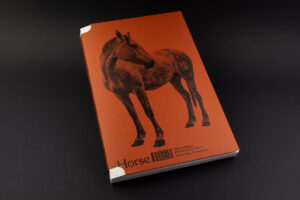YOUR CART
- No products in the cart.
Subtotal:
€ 0

SOLD OUT
Photography, concept and text:
Heleen Peeters
Essay:
Sylvine Pickel-Chevalier
Text editing:
Rianne van Dijck
Translations:
Cecily Layzell
Design:
Rob van Hoesel
Lithography:
Marc Gijzen
Production:
Jos Morree (Fine Books)
Print:
Wilco Art Books (NL)
Binding:
Wilco Art Books (NL)
Patist (NL)
Supported by:
Mondriaan Fund
Stichting Stokroos
Fonds Bijzondere Journalistieke Projecten
Sébastien van de Straten Fonds voor de fotografie
“A horse! A horse! My kingdom for a horse”, William Shakespeare had the British King Richard III cry out on the battlefield. A Bedouin legend has it that Allah took a handful of a south wind, gave it his breath and created the horse, “that will fly without wings and conquer without sword.” Over time the horse has been generously described by poets and writers.
Horses made a vital contribution to the history of humanity; as beast of burden, for waging wars; as a means of transport and on the farm. The status of the animal has changed since the industrial revolution. With the mechanization of agriculture and the entry of the car, the horse lost its practical function. It became a companion animal for recreation, sports and therapy. A less documented part of this history is the horse that serves as food.
In 1948 the grandfather of Heleen Peeters (BE) began a business in what many now consider to be taboo: horse meat. At that time, people were poor, recovering from the struggles of World War II, and horse meat, being a high quality product for an affordable price, was in high demand. But now, 70 years later, the horse meat industry is falling into decline.
Starting at the family business, Peeters explored horse (meat) culture in Belgium, France, Italy, Poland, Argentina, Uruguay, Kyrgyzstan, the United States and Canada. Why is horse meat becoming less popular? What happens to horses if they are no longer eaten? How do we relate to animals in the first place? And what about the need to cut back on our meat consumption?
This richly illustrated book navigates from breeders, competitions and rescue centers to slaughterhouses, factories and butchers.
Heleen Peeters studied photography at the London College of Communication in the United Kingdom; afterwards she obtained a master’s degree in media sciences from Leiden University in the Netherlands. Her work focuses on narrative photography. She does not see photography as an unambiguous window on reality, but as a reality with interpretation. In projects she therefore often combines her voice as an author with multiple perspectives – that of the subject, the public media or other artists – and allows them to react to each other. Editing and processing all these materials creates a new fictitious space for imagination. Peeters draws inspiration from her fascination for existentialism – themes such as the right to exist and transience are the common thread through her series. She sees photography as the medium of choice to explore these topics: it creates permanent documents that show a world in constant change.